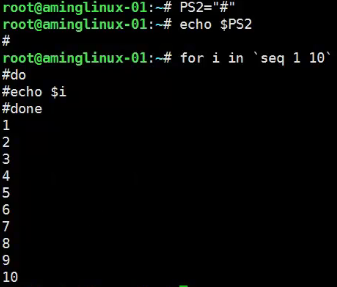查看变量
系统变量通常是大写
[root@chy002 ~]# env #查看系统常用的环境变量 XDG_SESSION_ID=3 HOSTNAME=chy002 ... ...
set 查看系统环境变量和用户自定义的变量,含有很多shell脚本。
[root@chy002 ~]# a=111 [root@chy002 ~]# echo $a 111 [root@chy002 ~]# env |grep 111 [root@chy002 ~]# set |grep 111 a=111 #env就没有,set有
变量命名
变量名规则:字母、数字下划线,首位不能为数字。
变量值有特殊符合时需要用单引号括起来。
[root@chy002 ~]# a=1 2 3 -bash: 2: 未找到命令 [root@chy002 ~]# a='1 2 3' [root@chy002 ~]# echo $a 1 2 3
#有特殊符合还是单引号靠谱 [root@chy002 ~]# b='1$au' [root@chy002 ~]# echo $b 1$au [root@chy002 ~]# c="4$ap" [root@chy002 ~]# echo $c 4
[root@chy002 ~]# c="$a$b" [root@chy002 ~]# echo $c 12 [root@chy002 ~]# c='`$a``$b`' [root@chy002 ~]# echo $c `$a``$b`
[root@localhost ~]# echo $c 4 [root@localhost ~]# a="$cl" [root@localhost ~]# echo $a [root@localhost ~]# a="$c"l [root@localhost ~]# echo $a 4l
全局变量
export 变量名=xxxxxx
在任何子shell和其他终端都可以使用。不会向上去全局,子shell的全局父shell不可用。
取消变量
unset 变量名 取消变量
环境变量配置文件
| 系统层次,一般不用修改 |
PS1在/etc/bashrc里面定义
[root@chy002 ~]# echo $PS1 [u@h W]$ PS2
 |
| 用户层次,用户家目录下 |
|